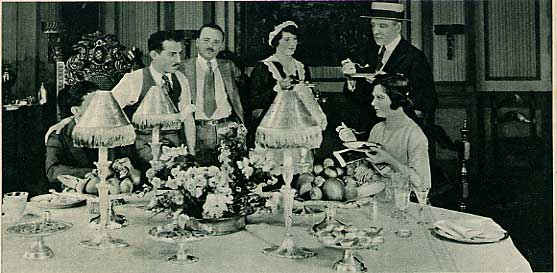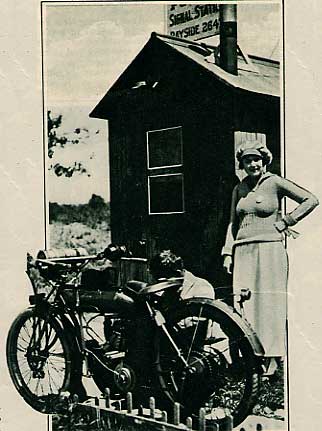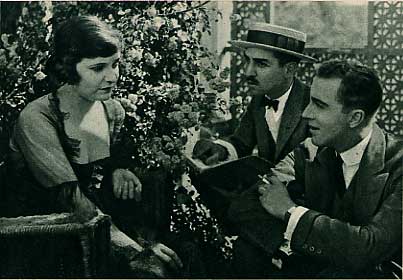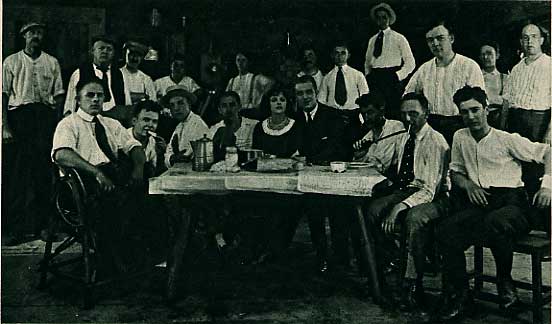

From Motion Picture Classic, November 1918, p. 39-40+
| Miss Talmadge with her director, Sidney Franklin; her dentist, Dr. Kenneth Campbell, Miss Rosemon, and Ramsey Wallace. |

"Rest the lights while they powder their faces."
"Ah, have a heart and let us rest our faces while they powder the lights!" came the sotto voice from an extra near-by.
The Young director, Sid Franklin, heard the voice and smiled, and then we all smiled. It was many degrees above the boiling point. A moment before we had all been groaning.
Norma Talmadge sat in the court-room with a heavy serge dress, a heavier cape, a hat, a veil and everything, and yet she looked as cool and contented as if she were taking a dip in her own Bayside waters. That's a little secret Norma possesses. No matter how uncomfortable conditions are she takes them calmly and pleasantly. But when you are rapidly becoming a screen favorite, why should any little thing, climatic or otherwise, ruffle your young disposition? say we.
 |
|
| Norma is now deputy sheriff of Queens County, L.I. Here she is standing in front of the Bayside police signal station watching for speeders, b'gosh! |
We were occupying one of those nice, sensational court-rooms that are the ice-cream and cake of the "sob-sister" squad. Norma was being divorced from Ramsey Wallace. After two years of life with Ramsey, Norma wasn't a bit adverse to a divorce, but it didn't please her that her husband-struggling-to-be-free should drag the name of her former suitor, Eugene O'Brien, into the proceedings and thus reduce his chances of becoming district attorney. But Ramsey was wealthy and money will not only get you a wife, but it will also aid you in getting rid of her if at any time her presence becomes annoying.
But, even tho Norma was suffering so and Eugene was losing his reputation with every turn of the camera crank, we worried not. We were hearing a wonderful scandal and were being paid for listening to it. Can you imagine a more delightful situation?
How came I to be having my mind corrupted with sordid court-room details? you ask. Well, on one of those withering noons to which no verse could do justice I boarded five ocean liners, three express trains, not to mention a half-dozen locals and a young car-barn of trolleys, and finally landed at the Norma Talmadge studio on East 48th Street with a fixed and stead determination to register in the hope that some day I might get a "close-up" of Norma. I registered with Director Franklin. He very kindly took my name and 'phone number with the promise that he would have his assistant call me at the first opportunity.
so many directors have said that
so few have.
 |
|
| Norma between scenes, talking things over with Director Franklin and Eugene O'Brien. |
However, one noon, just as "Miss Wriggles" and I were in the midst of an animated discussion of the advantages of anthropological excavation in the Far East, the 'phone rang. "This is Mr. Lascelle, Mr. Franklin's assistant," came back over the wire. "Can you come over to the Talmadge studio at once.?".
"I'll embark on the first outgoing steamer," I returned.
"I want you to play Miss Talmadge's maid," Mr. Lascelle explained when I reached the studio. "Take this slip to the costumer's, get a complete outfit and be back here as quickly as possible."
After reaching New York and selecting my dress, I fell into the Jonah jaws of a taxi in spite of the fact that my conscience told me an extra should not indulge in such luxuries. (My eyes have just recently resumed their normal slant as a result of keeping one fixed on the meter with the Hindu curse in its gleam and the other on the passing scenery.) When I arrived at the picture factory, Mr. Lascelle met me at the door with, "Postponed until tomorrow at 12:30." Such is the fate of a movie extra.
 |
|
| The Talmadge staff--Front row, left to right: Electrician Louis De Klade, Assistant Electrician Harry Torri, Ramsey Wallace, Director Franklin, Miss Talmadge, Mr. O'Brien, Property-man Tod Telford, Assistant Director Ward Lascelle, Camera-boy Leo Tover. Rear row: Camera-men Alfred Moses and Edward Wynard, Location-man Joe Rotham, Art Director Bernard Rogers, Director Charles McGuire, Still Photo-man Frank Puffer. |
For two days I stood around in my cap and apron gossiping with the Ramsey-Wallace-Belmont butlers and enjoying myself generally. Things were happening all round me, but I led a charmed existence. On the first day Norma, in a gray ostrich-trimmed georgette gown, sat at a long table and partook of a lonely meal while Alfred Moses and Edward Wynard ground out so many feet of film. Of course Norma was unhappy with so much to eat and nobody to eat it, and so when the cameras stopped grinding she called us to join her. Everybody gathered round, even Myron Selznick, the young studio manager--everything about the place seemed to be young, even the chicken salad--and Mr. Puffer snapped the scene.
"Ah, that's spoiled!" cried Norma.
"What happened?" asked Frank Bruner, her publicity man.
"The jelly wouldn't hold still."
On the second day Constance and Natalie, who had just run on from the Coast to visit Norma, flitted about he studio and made life even more interesting.
At the rate I was acting I expected to be an inmate of the Talmadge studio for the remainder of my life. But my maid role quickly became a thing of the past.
"As long as you didn't register in these scenes I can use you in the courtroom," was Mr. Lascelle's parting encouragement, and that was the reason for my presence at the famous trial.
The chauffeur, who in real life was the husband of the extra on my right and, according to her, not a villain at all, was swearing away the reputations of Norma and Eugene. It made no difference to the judge that Norma rose from her seat with the cry:
"It's a lie!"
Perhaps other young women had raised the same cry at their first divorce trial, so it caused not a flutter of the judicial eyebrow.
"I wonder how much longer this is going to last?" commented one of the witnesses near-by. "Was that not a dinner-bell I heard chiming from yon neighboring steeple?"
"Say, if you were a regular actor you wouldn't think of eating?"
"All off for dinner. Be back in your places at eight o'clock," Mr. Lascelle directed.
"Ha, ha, we work tonight, too?" said the blond. "That means I must engage a detective to carry home my bank-roll. What a merry little world this is!"
The dinner hour worked great changes in that studio, and when we returned to our places they were not. The courtroom had kindly given way to political headquarters where a meeting was to be conducted by the adherents of Eugene O'Brien. We were all interested in seeing this popular hero in real life. Then he appeared, tall and smiling and altogether good-natured."
"My director says that on this warm evening, this extremely warm evening rendered even warmer by these enthusiastic studio lights, I must make a speech!" he thundered. "I must make this gesture, and this gesture, and finally this gesture."
"Cheer him, audience," Mr. Franklin directed from some place in the background, and a husky "Hurrah!" went thru 48th Street.
"Very good, but the camera doesn't register voices. Show some action. Wave your hats, applaud, jump to your feet. Now ready. That's better--keep it up."
Unlike real political meetings, this one was done almost as soon as it was begun. Mr. Lascelle dismissed us around ten o'clock with instructions to be in our places at nine-thirty the next morning.
The next morning the previous day's scenes were shot from the front, and our faces instead of our backs registered absorption in the interesting divorce case.
It was warm that day, and I enthusiastically agreed with the decision of the Supreme Court that nice, spicy divorce trials should be specially preserved for dreary winter mornings. With the approach of noon the heat became even more affectionate.
"Would it be awful if we should faint en masse?" an optimist suggested.
"Now I have a hunch
if this wilting, withering bunch
Could have a little lunch
On which its teeth could crunch ---"
"Please, please!" her neighbor cried. "Aren't we suffering enough already?"
Soon we were partaking of the usual picture sandwiches and pie and unusual picture soda like a mind with but a single thought. By constant practice one learns to deftly balance a glass in one hand, a piece of pie in the other, while putting a ham sandwich thru the steps of the maxixe on the tip of the tongue.
"Now that Norma's rid of Ramsey, I suppose she'll marry Eugene."
"Why, didn't you hear the property boy say that she kills herself and Ramsey, too?"
"That's a funny way to end a play. Personally, I think you're mistaken. There must be a catch somewhere."
Of course there must be. Who would give five thousand dollars to George Scarborough for a scenario without a catch, or Mary Murillo, if she couldn't manage to supply one? The raven answers "Not Joseph Schenck," and Miss Wriggles," with a look of withering scorn at the intruder, sighs:
"I shall not be able to enjoy another chicken bone until I see 'Her Only Way' and discover the catch."
Many thanks to Randy Bigham for supplying this article
Last revised, December 16, 2002